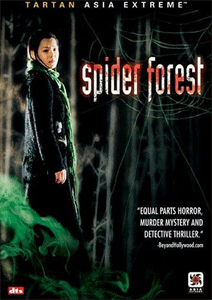Film
Index
Manifesto: One of the things that drives me absolutely up the wall about interacting with fans of horror movies is the persistent notion that "horror" can be put into some kind of box. It's the impulse that leads some fans to declare that such and such isn't really a horror movie because it fails to meet some arbitrary criterion (whether that criterion is supernatural content, graphic violence, or an R-rating is entirely incidental). I think British film critic Kim Newman had the right idea when he titled his book on the subject "Nightmare Movies" rather than "Horror Movies." It sidesteps the issue quite nicely. I want to emphasize this point because my category page for horror movies states quite clearly that I admit films into the canon of "horror" movies that would be denied entry by a LOT of fans of the genre. My notion of what constitutes a "horror" movie is unusually broad. It makes sense to me to treat, for example, Being John Malkovich or Mulholland Dr. as horror movies because they utilize horror movie narrative structures, explore horror movie themes, or otherwise get under the audience's skin in the same manner as a horror movie in spite of having different concerns than many canonical horror movies. I want to make this clear: horror is first and foremost an emotion, not a genre. Of course, this explains why no one can agree on what actually constitutes a horror movie. Horror is among the most subjective of emotions. What scares me won't necessarily scare you. This subjectivity is also why horror movies endure even as other genres ebb and flow. It can't be pinned down to a formula, no matter how much marketers and hacks may try. Horror is far more protean than that. Even filmmakers who have success at making horror movies struggle to capture lightning in a bottle more than once or twice.
Like several other recent Korean films, Spider Forest--the topic of this review--is one of those films that will incite this debate. It's closer to David Lynch than it is to George Romero. It's a genre-buster in which horror stems not from graphic violence or supernatural apparitions--there are instances of both in the film--but from questions of identity and basic epistemology. This sort of thing used to be part and parcel of the genre, back when horror stories hadn't yet been cut whole and bleeding from the gothic novel. Spider Forest takes the horror film back to that first principle. At its core, it is a gothic narrative, a spiraling introspection whose ultimate destination isn't nearly as important as the path it follows to get there. This has more in common with Absalom, Absalom than it does with The Ring.
The premise is straight out of the genre factory: Kang Min (Woo-seong Kam) awakens in a forest. He walks up to the nearby house where he finds the dismembered body of a middle-aged man and his dying girlfriend. He catches a glimpse of the killer and chases him out of the forest into a tunnel, where he is promptly smashed by an oncoming car. Miraculously, he survives the accident AND the subsequent brain-surgery, but he's left with gaps in his memory. The memories that he DOES retain point towards himself as the murderer in the woods. This is NOT a new story (or, rather, a new story structure). There's an entire generation of screenwriters who seem to have discovered Cornell Woolrich's The Black Curtain and Last Year at Marienbad all at the same time. Unlike some of those, this isn't a puzzle movie. This isn't a movie where the final piece falls into place, prompting the lightbulb to go off over the audience's head. The facts of the case are fairly transparent from the get-go. As I said before, the end of the film isn't as important as the narrative itself.
The bulk of the film is concerned with memory, grief, and loss. The individual scenes that comprise the film are snapshots of a life that might have been and the arbitrary assemblage of images and individual scenes circle around awful events that act as signposts in that life. The film is not only psychological, it's psychoanalytic. The film is conscious of its symbols. Kang's first wife does a mime for her husband over dinner. The mime tells the story of Eve and the Serpent. Later in the film, one character eats an apple while brutally raping another. The forest itself inspires a retelling of Hansel and Gretel, with a MUCH different ending. All of these scenarios return eventually to the central murder that drives the film, approaching it from a different epistemological standpoint every time. It's almost as if director Il-gon Song is taking his cues from the cubist paintings of Braques or Picasso, which is an approach I like. This approach bears comparison with the similarly titled Spider by David Cronenberg, which employs a similarly fractured narrative for comparable reasons.
Like many recent Korean productions, this is a master-class in basic film craft. The camera is always in the right place. The lighting schemes are evocative. The locations are textured. And the performances are first rate. One doesn't normally think of Asian horror films as being "actors'" films, but this one surely is one. Woo-seong Kam is superb in the lead, a role that takes him from innocence to knowledge, from a state of grace to a shuddering fall, and back again. He carries the film ably, though he's not alone. Jung Suh is equally good in a difficult double role. Even if one thinks the film's script is too arbitrary and too diagramatic (an argument can be made, I suppose), the film is never less than compelling.

11/22/2005